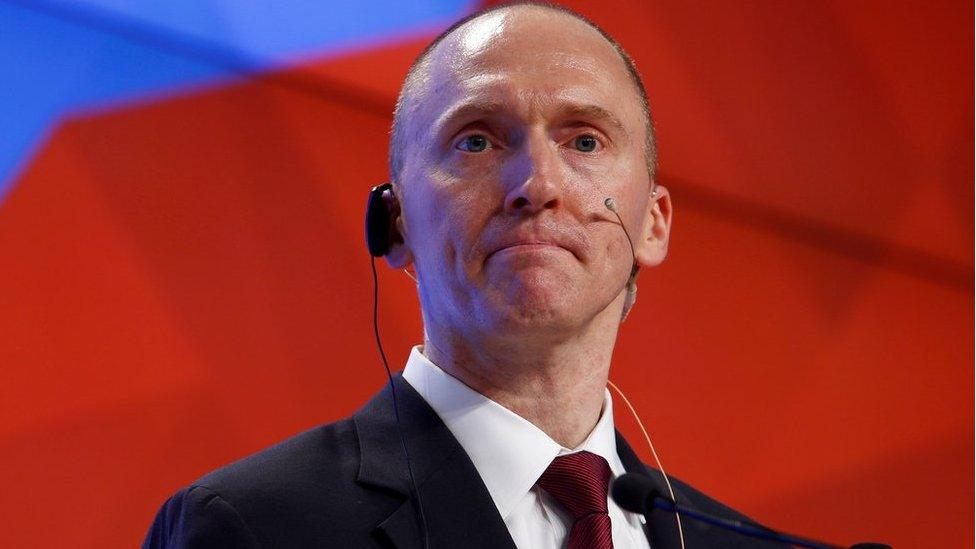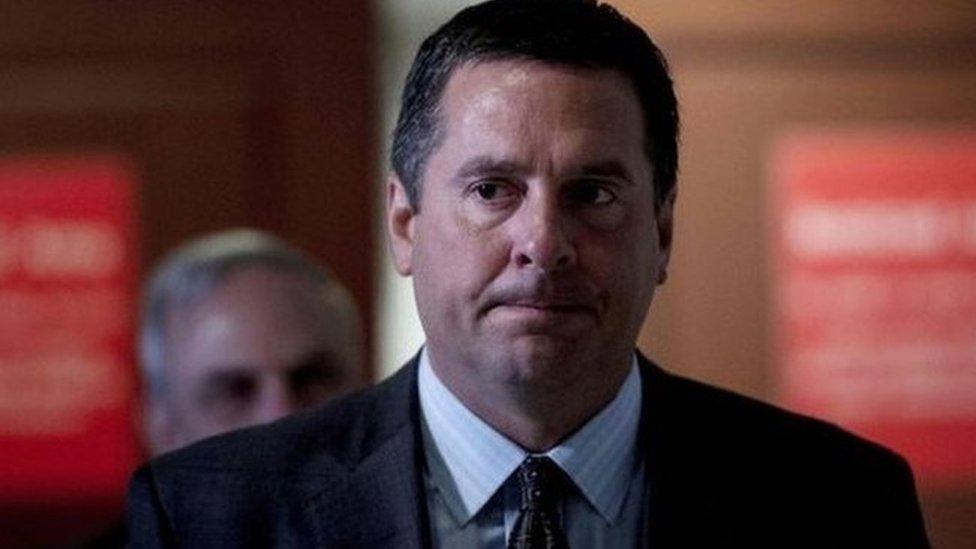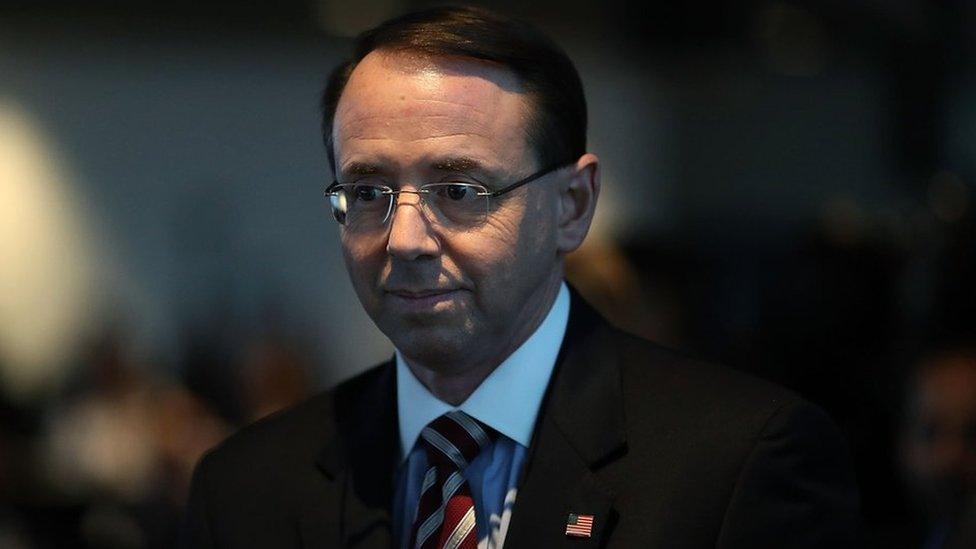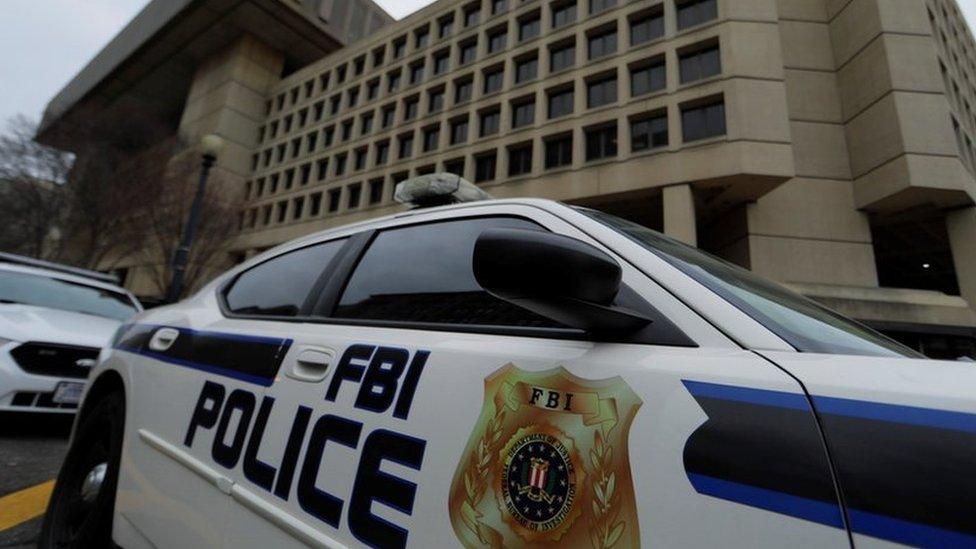Trump accuses FBI leadership amid row over memo
- Published
All you need to know about the Trump-Russia investigation
US President Donald Trump has accused top officials of politicising FBI and justice department investigations to damage his Republican party.
Later on Friday, he is expected to approve the release of a memo that is thought to suggest the FBI abused its powers to spy on one of his aides.
Controversy over the memo has railed for days in US politics and the two main parties are divided on it.
Democrats say the document is aimed at derailing investigations into Mr Trump.
They portray the memo, commissioned by the Republican head of the House Intelligence Committee, Devin Nunes, as an attempt to undermine a federal inquiry into allegations that the Trump campaign colluded with Russia during the 2016 election campaign.
However, another top Republican, House Speaker Paul Ryan, played down the potential impact of the memo's publication on the inquiry led by Special Counsel Robert Mueller.
He said Congress had a duty to see surveillance powers were used correctly.
Mr Trump tweeted, external: "The top Leadership and Investigators of the FBI and the Justice Department have politicized the sacred investigative process in favor of Democrats and against Republicans."
The current FBI director, Christopher Wray, was nominated to the post by Mr Trump after the president dismissed his predecessor, James Comey.
Last week the agency's deputy director, Andrew McCabe, resigned. Mr Trump had repeatedly accused him of political bias but the White House said the president was not involved in the decision.
What's in the secret memo?
Approved by the House Intelligence Committee on Monday, the document reportedly accuses the FBI (Federal Bureau of Investigation) and justice department of misleading a judge in March of last year while seeking to extend a surveillance warrant against Carter Page.
The memo is said to argue the FBI and justice department did not tell the judge that some of their justification for the warrant relied on a much-disputed Trump dossier.
Compiled by a former British intelligence agent, Christopher Steele, that dossier was financed in part through the campaign of Democratic presidential candidate Hillary Clinton to dig up dirt on Mr Trump.
Unnamed sources told Reuters news agency the Republican memo was misleading because all the dossier excerpts used in the FBI warrant application were independently confirmed by US intelligence.
Who's who?

Carter Page, 46, a foreign policy adviser to the Trump campaign, visited Russia several times in 2016. He adamantly denies allegations in the Trump dossier that he served as an intermediary between Russian officials and the Trump campaign.

Devin Nunes, 44, has long been pursuing President Trump's claims that he was put under surveillance by the Obama administration - so much so that the congressman was dubbed "Inspector Clouseau" by a fellow Republican, external, Sen Lindsey Graham, in March.

Rod Rosenstein, 53, was appointed deputy attorney general last April. He is said by the New York Times to have been involved at various points in authorising applications for the surveillance, external. President Trump questioned his loyalties, external in December, CNN reports.
Are Republicans united over the memo?
House Speaker Ryan denied the memo was an indictment of the FBI and justice department.
"It does not impugn the Mueller investigation, or the deputy attorney general," he added.
He said it was job of his chamber to "conduct oversight over the executive branch if abuses were made".
Another House Republican who read the memo, Jeff Duncan, predicted it would shake the FBI "down to its core".
It would, he tweeted, show "Americans just how the agency was weaponized" by the Obama administration and Democrats to "target political adversaries".
Allow X content?
This article contains content provided by X. We ask for your permission before anything is loaded, as they may be using cookies and other technologies. You may want to read X’s cookie policy, external and privacy policy, external before accepting. To view this content choose ‘accept and continue’.
Several Republican lawmakers are opposed to releasing the memo.
John Thune, who is the party's number three in the Senate, said FBI objections should be heeded. Senators Lindsey Graham and Susan Collins also voiced unease.
Senator Jeff Flake teamed up with a Democrat, Chris Coons, to issued a joint statement.
It said releasing the memo "risks undermining US intelligence-gathering efforts, politicizing Congress' oversight role and eroding confidence in our institutions of government".
Why are Democrats calling for Mr Nunes to go?
Congressional Democratic leaders called on Thursday for Mr Nunes' immediate removal as chairman of the House Intelligence Committee.
Democratic Congressman Adam Schiff accused Republicans of having amended the memo after it was approved.
However, an unnamed Republican aide said the amendments were grammatical changes and "minor edits", including two tweaks requested by the FBI and by Democrats.
How's the FBI itself responding?

It has voiced "grave concerns about material omissions of fact that fundamentally impact the memo's accuracy".
The justice department, which oversees the FBI, has warned the memo's release could jeopardise intelligence-gathering and damage trust between the agency and lawmakers.
Pressure has mounted on the FBI, which is the subject of a forthcoming inspector general report.
Its deputy director, Andrew McCabe, resigned on Tuesday. He had been repeatedly accused of political bias by President Trump.
James Comey, who led the FBI at the time of the 2016 election and who was sacked by the new president, suggested the agency was being subjected to a witch hunt by "weasels and liars".
What happens next?
While President Trump is expected to approve the memo's release, the exact method for publishing it is "still being figured out", the Associated Press news agency reports.
As president, Mr Trump has the power to declassify the document himself and either release it or hand it to Congress to release.